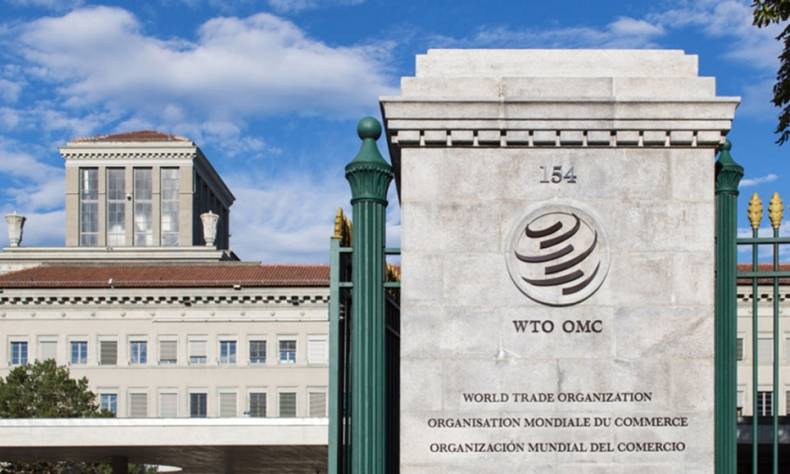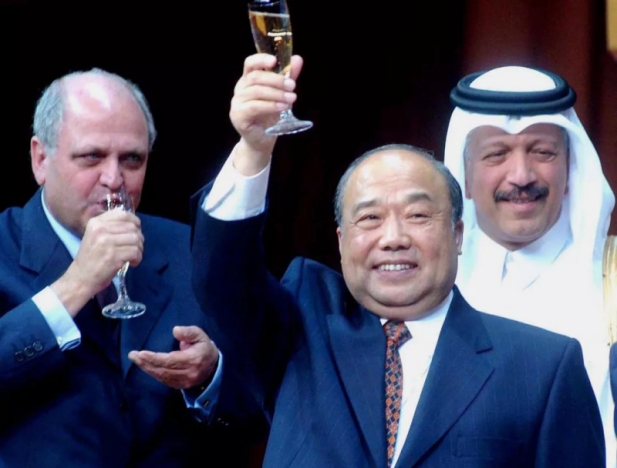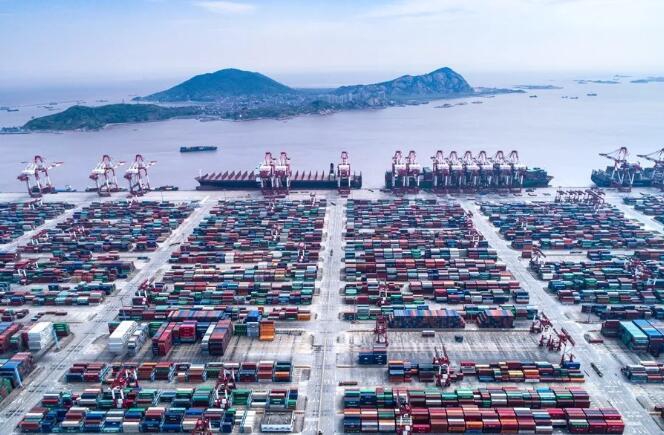
China Has Fully Fulfilled Its WTO Commitments
China has been a staunch advocate of the multilateral trading system, and fully honored its commitments to the WTO in all aspects.
By Hong Junjie
China formally got access to the World Trade Organization (WTO) on December 11, 2001, as the 143rd member of the international body. Since then, China has been a staunch advocate of the multilateral trading system, and fully honored its commitments to the WTO in all aspects.
Δ On November 10, 2001 after signing China’s WTO accession agreement, Shi Guangsheng, then China’s Minister of Foreign Trade and Economic
Cooperation toasts China’s entry to the international body with representatives of other WTO member countries.
China has built a quite complete foreign trading legal system. Law and regulations are the basis and guarantee for economic activities. After its accession to the WTO, China has abolished and revised around 2,300 laws, regulations and rules which were incongruous with the WTO rules and China’s commitments to the organization. Meanwhile, China has also made great efforts to improve its legal system concerning trade promotion, trade remedy, and intellectual property rights protection, thus having perfected its legal framework regarding foreign economic relations and trade.
China has lowered tariffs and cut non-tariff measures. In the transition period after its entry to the WTO, China’s overall imported commodity duty level has gradually declined to 9.9 percent in 2005 from 15.3 percent in 2001. As of January 2005, China has honored the majority of its commitments on tariff reductions. In 2010, China’s overall tariff level dropped to 9.8 percent. China’s tariff binding rates have been maintained at one hundred percent since 2005. After deducting factors related to the trade structure, China’s actual average trade weighted tariff only stands at 4.4 percent, very close to the developed economies of the WTO.
To further open its domestic market, since 2015, China has lowered tariffs on imported goods for daily consumption multiple times. One noticeable move came in May 2018 when China announced remarkable slashing of tariffs on imported daily consumption goods. The decision will take effect on July 1. This wave of tariff reduction involves 1,449 taxable items, covering over 70 percent of taxable items for daily consumption. Thus the average tariff rate will drop to 6.9 percent from the former 15.7 percent. Against the background of raging trade protectionism in the globe, China’s tariff reduction will not only benefit its domestic consumers but send a positive signal to the international community.
Δ The total expansion of import and export operation rights has promoted the development of China’s
foreign trade economic entities as well as the flourishing of China’s international trade.
China has granted import and export operation rights to enterprises thoroughly. According to the Foreign Trade Law of the People’s Republic of China revised in 2004, from July 2004 onwards, foreign trade dealers shall register with the authority responsible for foreign trade under the State Council to get operation rights instead of waiting passively to be examined and approved. The government will protect the legitimate rights and interests of all foreign trade dealers. In this way, common prosperity among SOEs, foreign-invested enterprises, and private enterprises is expected. The total expansion of import and export operation rights has promoted the development of foreign trade economic entities as well as the flourishing of China’s international trade.
China has also opened its services market wider to the outside world. China has earnestly fulfilled its WTO commitments. It has offered unprecedented market access to overseas service providers in areas of finance, telecommunications, architecture, distribution, logistics, tourism, and education. China has also opened 100 sections catering to 160 categories of the WTO General Agreement on Trade In services, almost reaching the average level of developed countries. Based on a prior tentative Negative List, the country will generalize Negative List management across the whole country, expand the opening up of the financial industry and push forward that of other sectors such as transportation, commerce and logistics, and professional services. Besides, service trade pilot zones will be set up in Beijing, Tianjin, Xiong’an, and other 14 provinces, cities, and areas for innovative development, and look for an orderly opening up of trade in services.
Up to 2010, all of China’s commitments to join the WTO have been fulfilled. Mike Moore, Supachai Panitchpakdi, and Pascal Lamy, the three WTO Directors General since China joined the WTO, have all fully affirmed the China’s tremendous efforts and achievements. According to Lamy, China’s accession to the WTO is a milestone that will go down in history books and a typical example of win-win results from openness, competition, and economic integration. The Chinese government accepted six trade policy reviews of the WTO in 2006, 2008, 2010, 2012, 2014, and 2016. The practical actions taken by China to earnestly fulfill its commitments have been recognized by most WTO members.
Hong Junjie is the dean of the School of International Trade and Economics, University of International Business and Economics.
Source: China Today
Opinion articles reflect the views of their authors, not necessarily those of China Focus
 Facebook
Facebook
 Twitter
Twitter
 Linkedin
Linkedin
 Google +
Google +












